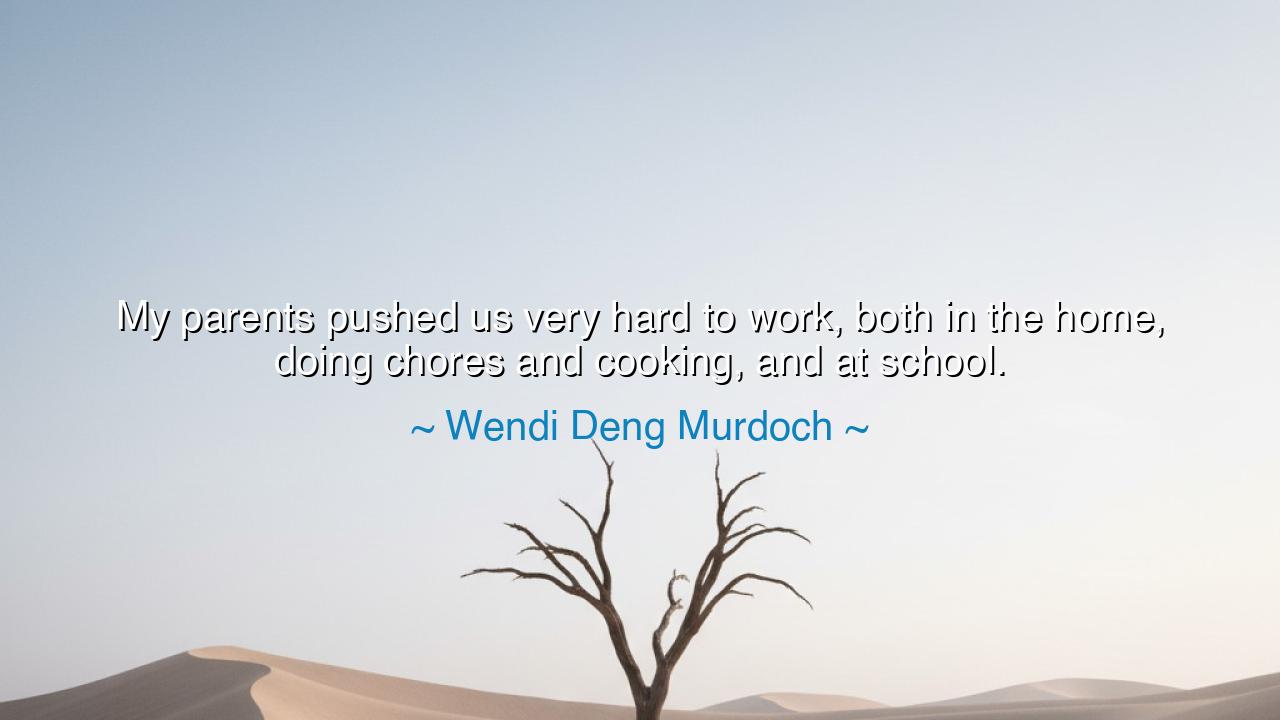
My parents pushed us very hard to work, both in the home, doing
My parents pushed us very hard to work, both in the home, doing chores and cooking, and at school.






In the humble and reflective words of Wendi Deng Murdoch, “My parents pushed us very hard to work, both in the home, doing chores and cooking, and at school,” there lies a truth older than civilization itself—the eternal law that discipline is the mother of greatness. These words are not merely a recollection of childhood, but an ode to the ancient wisdom that strength is forged in labor, and character is born in the quiet persistence of daily duty. Murdoch speaks not of hardship with bitterness, but of gratitude—for she understood, as all the wise do, that the hands that are trained to serve, the mind that is trained to strive, and the heart that is trained to endure will one day shape worlds.
The meaning of this quote is simple yet profound. It teaches that true success does not spring from luck, talent, or privilege, but from the soil of hard work and responsibility. The chores done in youth, the lessons studied in exhaustion, the diligence demanded by loving but firm parents—all these are the stones upon which the temple of adulthood is built. In the act of working for one’s family and one’s education, the young soul learns humility, endurance, and gratitude. To work for the home is to understand belonging; to work at school is to understand growth. These two labors—the domestic and the intellectual—shape not only skill but spirit, giving rise to a person who stands strong when others falter.
The origin of these words is deeply rooted in Murdoch’s early life in China, where discipline and education were seen as sacred pathways to a better future. Born in a time of transition and change, she was raised in a home where idleness was not permitted and diligence was a sign of respect—to oneself, to one’s family, and to one’s destiny. Her parents’ insistence on hard work was not cruelty, but love expressed through expectation. They saw in their children the seeds of possibility and knew that those seeds would only grow through effort. It is the same wisdom that echoes across cultures and generations: that a child who learns to labor learns to live, and that comfort without effort breeds only fragility.
This principle has been proven by the lives of many who rose from simplicity to greatness. Consider Abraham Lincoln, who as a boy split logs, plowed fields, and read by firelight after days of toil. His parents did not spare him work, and from that labor he gained not only strength of body but fortitude of spirit. The discipline that shaped his youth became the moral steel that guided a nation through its darkest hours. Like Murdoch, Lincoln’s greatness was born not in luxury, but in the crucible of duty and perseverance. The chores that seem small in childhood often prepare the soul for burdens that are vast in adulthood.
There is a moral symmetry in this truth: those who are trained to give effort in small things become trustworthy in great ones. A child who learns to sweep the floor with care learns to manage the affairs of the world with the same attention. A student who stays awake to study long after others have gone to bed carries that same determination into every endeavor of life. Murdoch’s words remind us that even the smallest acts of work are sacred rehearsals for the greater challenges that destiny will one day deliver. The home, then, becomes the first school; the parents, the first teachers; and labor, the first lesson in wisdom.
Yet there is also tenderness in her reflection. Behind the command to “work hard” lies love’s hidden hand—the desire of every parent to see their child rise higher than themselves. When Murdoch recalls her parents pushing her to labor, she does not speak of oppression, but of preparation. For she knows that to deny a child the chance to struggle is to deny them the chance to grow. The trials of youth, though they seem harsh at the time, later reveal themselves as blessings. Every dish washed, every exam studied for, every chore done in fatigue—all these become the invisible foundations of confidence, resilience, and pride.
So, dear listener, the lesson is clear: embrace work, not as burden, but as blessing. The effort you give to your home, your studies, your craft—these are not wasted moments, but the training of your soul. Do not seek the easy path, for it leads only to emptiness. Instead, walk the path of diligence, and let every task refine you. Remember that even the greatest trees draw their strength from the unseen roots of patience and persistence. Let your hands learn humility through labor, your mind gain clarity through study, and your heart find purpose in the service of others.
Thus, in the spirit of Wendi Deng Murdoch, we are reminded that the true inheritance a parent gives is not wealth, but work ethic—not comfort, but courage. The ones who push us hardest often love us most, for they see in us the fire that we cannot yet see in ourselves. Cherish that fire, tend it with care, and let it burn brightly in all you do. For in the end, it is not the ease of our youth that defines us, but the strength we earn through toil. And from such strength, every generation builds the world anew.






AAdministratorAdministrator
Welcome, honored guests. Please leave a comment, we will respond soon